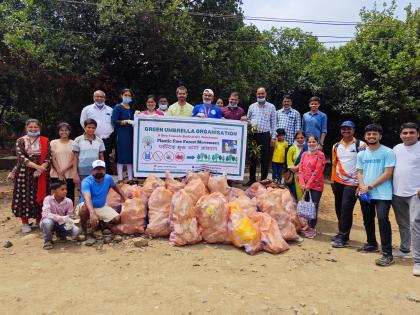Green Umbrella Organization Leads Effort to Combat Plastic Pollution in Maharashtra Forests
By Nirmeeti Patole | Published: May 27, 2024 06:43 PM2024-05-27T18:43:43+5:302024-05-27T18:44:55+5:30
The dense forests, streams, and rivers of the Sahyadri range are facing adverse impacts on their biodiversity and wildlife ...

Green Umbrella Organization Leads Effort to Combat Plastic Pollution in Maharashtra Forests
The dense forests, streams, and rivers of the Sahyadri range are facing adverse impacts on their biodiversity and wildlife due to the menace of littering. Recognizing the gravity of this issue, the Mumbai-based Green Umbrella Organization has been organizing a “Plastic Free Forest” campaign for the past three years. They have organized this campaign in forests ranging from Bhimashankar Wildlife Sanctuary, Thane’s Yeoor Hills, Tungareshwar Wildlife Sanctuary, Harishchandragad, and Phansad Wildlife Sanctuary, among others. During this initiative, volunteers collect plastic waste, slippers, chocolate wrappers, clothes, and other litter disposed of by tourists, devotees, and trekkers in the jungle areas, aiming to make the forests litter-free. The plastic waste is then recycled into biofuels.
While speaking to LokmatTimes.com, Vikram Yende, the founder of the Green Umbrella Organization, highlighted the group's long-standing efforts to conserve and promote indigenous tree species native to regions like Mumbai, Thane, Pune, and Satara. Over the past 14 years, their organization has been dedicated to this cause, but they faced challenges due to the forest department's focus on cultivating non-native trees like peltophorum, acacia, and gliricidia over native ones like anjani, baheda, and pachunda. Additionally, they struggled to obtain seeds of native trees from plant nurseries. Undeterred by these obstacles, Yende explained, “We embarked on a quest to search for these native seeds deep within the forests of Maharashtra.” However, during their expeditions into the wilderness, they encountered a concerning reality. “Most of the forests were choking under the menace of plastic pollution,” Yende revealed. “With the surge in tourism activities, an alarming amount of plastic waste was being carelessly discarded within these pristine natural habitats.”
For the past three years, Green Umbrella Organization has been carrying out plastic-free forest campaigns across 13 to 14 forests in Maharashtra over specific time intervals. Yesterday, they conducted a “Plastic Free Forest” campaign at Bhimashankar Wildlife Sanctuary. “Nearly 30,000 people visited Bhimashankar yesterday. There are no provisions for dustbins in the area. We collected approximately 8,000 plastic bottle lids from the temple and forest premises. Forty sacks of total plastic were collected, which weighed around 100 kilograms,” Yende said. Their team comprised 30 to 40 volunteers. “Two to three forest department officials helped us in our plastic collection and provided us the required number of sacks. Many tourists throw the plastic waste deep inside the valley, which later negatively affects the Bhima River too,” Yende added.
Ramesh Sandbhor, a Thane-based volunteer with Green Umbrella Organization, told LokmatTimes.com, “Plastic pollution stops the growth of wild vegetables like kantola and bondara. The land too becomes infertile. Indrayani and Bhima rivers have almost become gutter-ganga. Drainage water is being shifted to these rivers. There are many cows and buffaloes behind the Bhimashankar temple premises. As there is no proper management, these animals roam here and there in the jungle and consume the plastic.” Similarly, in Thane’s Yeoor Hills, the plastic quantity is high. “There are many glass and plastic bottles found in Yeoor. We collect the plastic, and it is segregated and recycled through organizations like Samarth Bharat,” Sandbhor said.
Yende shared an instance of how their team collected nearly 10,000 medicine bottles dumped by an Ayurvedic company near Pimpri’s Kundalika Valley. “We collected the plastic waste for three days continuously. It was raining heavily, but we were determined to save our nature from plastic. Microplastics, which are less than 5 millimeters in size, pose a threat to plants by inhibiting seed germination, root elongation, and nutrient absorption,” Yende stated. He suggested municipal corporations, gram panchayats, and even IT companies should come forward and start certain CSR activities to solve the plastic pollution problem. “We give opportunities for nature enthusiasts to participate as eco-conscious citizens and contribute to preserving the ecological sanctity of the forests. However, local administrations and organizations should think about installing plastic bottle crushers and come up with mechanisms to stop plastic littering,” Yende said.